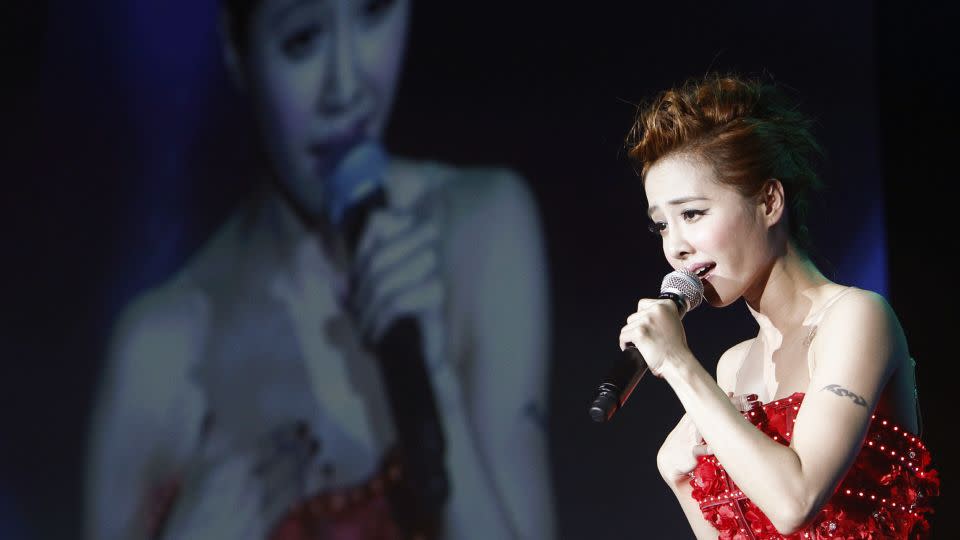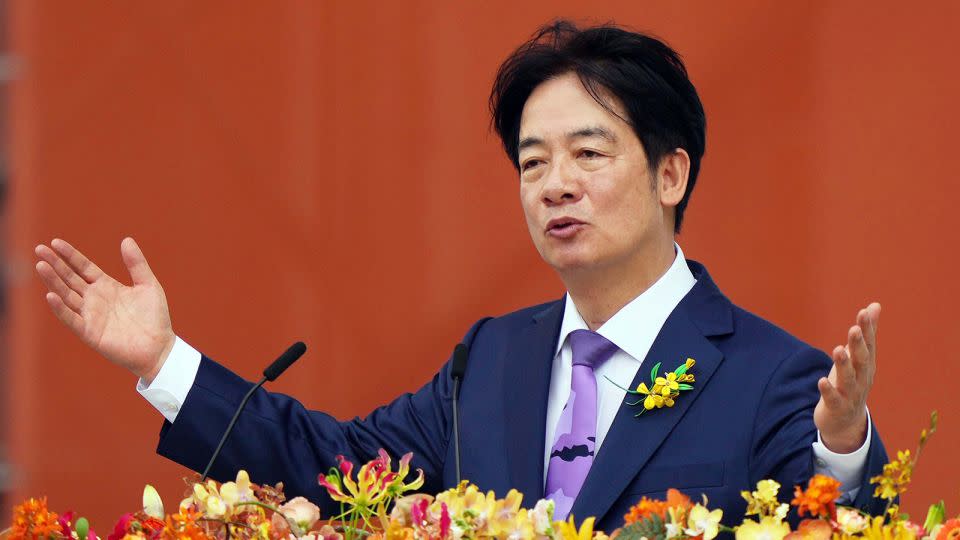Taiwan celebrities in crossfire of political battle as tensions with China rise
As Taiwan’s biggest rock band took to the stage in Beijing late last month, their home island was reckoning with the latest act of Chinese aggression.
For two days, the self-governing democracy was encircled by Chinese warships and fighter jets in the largest military exercises in over a year.
Addressing the tens of thousands of fans at the sold-out Bird’s Nest stadium, Mayday’s lead singer Ashin did not mention the aggression. But what he did say has since caused no less friction.
“We Chinese people must eat roast duck when we come to Beijing!” he said.
It may sound like an innocuous travel tip, but his choice of words was freighted with political meaning. Ashin – one of Taiwan’s biggest music stars – had referred to himself as Chinese, instead of Taiwanese.
The choice of words delighted the crowd, but sparked immediate anger back home – reflecting the precarious position of Taiwanese stars with mainland appeal.
Growing numbers of people in Taiwan – especially the younger generation – view themselves as distinctly Taiwanese. Many have no desire to be part of China, whose authoritarian ruling Communist Party views the self-ruled island as its territory, despite having never controlled it.
Beijing has long sought to bolster its claims by emphasizing the cultural and historical ties between the two sides, but polls show only 3% of Taiwan’s population identify primarily as Chinese – while 67% see themselves as primarily Taiwanese, and less than 10% now support an immediate or eventual unification with China.
Under the leadership of Xi Jinping, Beijing has become more aggressive toward Taiwan, and has abandoned official ties since the island’s ruling Democratic Progressive Party came to power in 2016. But there is still considerable cultural overlap. Both sides speak Mandarin, meaning musicians from Taiwan – population 23 million – often seek to enter the lucrative market of 1.4 billion across the strait.
As Beijing and Taipei have drifted further apart politically, these artists have come under increasing pressure to toe Beijing’s political line. The same evening that Mayday was playing in Beijing, Taiwanese pop queen Jolin Tsai proclaimed on stage that fans in “our Chinese city of Nanchang” were the most passionate, as she performed in the southern city. The phrase was taken by some Chinese fans as implying she and her audience were compatriots.

Meanwhile on Weibo, China’s X-like platform, dozens of Taiwanese actors, musicians, and celebrities reposted a state media post championing Beijing’s claims of sovereignty over the island.
“‘Taiwan independence’ is a dead end, and the reunification of the motherland is unstoppable!” broadcaster CCTV said in the post, which has been retweeted nearly 18 million times since it was published last Wednesday.
On Douban, a popular site for reviewing movies, books and music, users compiled a list of nearly 100 Taiwanese celebrities, detailing whether each of them had shared the post.
Despite her on-stage expression of kinship, some lashed out at Tsai for not reposting it. A comment with 14,000 upvotes called for authorities to suspend her concerts in China, because she “had never spoken out directly.”
CNN has reached out to Tsai for comment.
On Saturday, CCTV publicly endorsed Taiwanese celebrities who shared its post, sharing the screenshots of 36 such reposts – fueling a further backlash against those who hadn’t.
“Those who didn’t endorse and take a stand, can you not come to the mainland to make money?” said a top comment with 55,000 upvotes.
Lin Chen-yu, a lecturer at Cardiff University who specializes in China’s censorship of Taiwanese music, said acts such as Tsai and Mayday were facing problems because “both the government and private sectors are increasingly reacting to and engaging with digital nationalism.”
And the marketing apparatus that can launch mainland careers is equally set up to avoid upsetting Beijing authorities.
“For instance, management or touring contracts for activities in China increasingly include clauses that ban celebrities from making statements against the ideologies of the Chinese state,” she said. “This, of course, includes any pro-Taiwan statements.”
Celebrities deemed as crossing Beijing’s political red lines are often blocked from the Chinese market, with their names and works erased from television and online platforms.
“For example, musicians’ work can be easily removed from streaming platforms (in China), often automatically, if their names become keywords for censors on these platforms and media,” Lin said.
Backlash at home
Mayday appear to have avoided upsetting officials in China during their Beijing show, but many Taiwanese fans say they are deeply disappointed.
A whole generation of Taiwanese people grew up listening to the band’s happy-go-lucky, pop-infused rock songs about the hope and heartbreak of youth, so much so that the 25-year-old band is sometimes dubbed the “Asian Beatles.”
“As much as I used to like you, now I’m just as disappointed,” said a comment on Mayday’s Facebook page, after the Beijing concert.
“I’m Taiwanese. Goodbye.” a fan said on Ashin’s Facebook page.
CNN has reached out to Mayday’s record company B’in Music for comment.
On Monday, Taiwan’s Mainland Affairs Council weighed in, accusing the Chinese Communist Party of requiring Taiwanese artists to express a political stance.
“Such political maneuvers will not win over the hearts and minds of Taiwanese people, and will only deepen Taiwanese society’s resentment towards the Chinese Communist regime,” the council said in a statement.
The remarks and retweets by Taiwanese artists of the CCTV unification post came against the backdrop of China’s largest show of force around the island in more than a year. The Chinese military called the drills a “strong punishment” for Taiwan’s so-called “separatist acts” and said they were designed to test its ability to “seize power.”
That military muscle-flex was sparked by the inauguration of Taiwan’s new President Lai Ching-te, who is openly loathed by Beijing for championing the island’s sovereignty and distinct identity.

As the backlash mounted in Taiwan against the musicians, Lai struck a conciliatory tone.
“This is not the first time, and probably not the last, that Taiwanese artists are forced to make a political stand in China,” said the leader.
“Under the roof of others, it’s one thing what our artists say, but what’s more important is what they truly feel in their hearts. We should offer them understanding and empathy.”
Beijing officials said the Taipei administration was wrong to say artists were being coerced.
Zhu Fenglian, a spokesperson for the Taiwan Affairs Office, said Taiwanese celebrities who reposted the Weibo “reunification” message wanted “to express that both sides of the Taiwan Strait are both Chinese.”
“These are natural expressions of true feelings,” Zhu said.
Taiwanese acts in the Chinese market will continue to endure an invidious position, said Lin, of Cardiff University.
“However, it is time for the industries in Taiwan to re-evaluate what this means for our society,” she said. “The circulation of these works comes with a price – a significant loss of freedom and autonomy.”
For more CNN news and newsletters create an account at CNN.com


